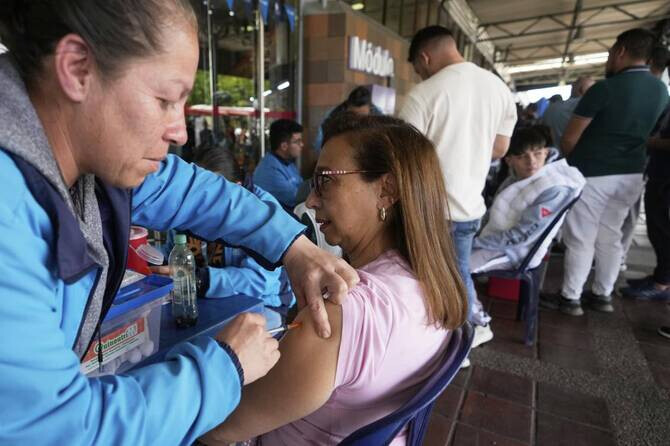
A deepening health crisis is unfolding in Colombia as a significant yellow fever outbreak persists, raising concerns of a protracted state of emergency extending into May 2025. The Colombian Ministry of Health has released alarming figures, reporting 60 confirmed cases and a tragic death toll of 24 individuals so far this year. The department of Tolima has emerged as an epicenter, grappling with a staggering fatality rate exceeding 40%, with over a dozen deaths recorded in the past six months alone. This alarming statistic has triggered widespread apprehension among public health officials and underscores the virulence of the current strain.
The geographical proximity of Tolima to Bogotá, Colombia's bustling capital city located a mere 320 kilometers away, amplifies the urgency of the situation. With a population exceeding seven million, Bogotá presents a fertile ground for potential transmission, necessitating the swift implementation of stringent quarantine protocols and robust surveillance mechanisms to prevent a wider epidemic.
The specter of regional spread further complicates the crisis. The United States Centers for Disease Control and Prevention (CDC) has issued urgent advisories for travelers venturing into Colombia's neighboring nations – Brazil, Bolivia, and Peru. Reports of newly identified yellow fever outbreaks in specific regions within these countries have prompted the CDC to strongly recommend preemptive yellow fever vaccination for all travelers. The agency emphasizes that vaccination should be administered at least ten days prior to departure to ensure adequate immunity. Notably, the CDC advises booster shots for individuals vaccinated more than a decade ago or those intending to visit high-risk areas where transmission is active.
Yellow fever, a perilous acute viral hemorrhagic disease, is transmitted through the bite of infected Aedes and Haemagogus mosquitoes. Despite the existence of a highly effective vaccine, the ongoing outbreak in Colombia is characterized by a disturbingly high mortality rate, posing a grave threat to public health infrastructure and the well-being of the population. The disease typically manifests initially with non-specific symptoms such as fever, chills, headache, back pain, and muscle aches. However, progression to a more severe phase can involve jaundice (yellowing of the skin and eyes), hemorrhage (bleeding from the mouth, nose, eyes, or stomach), shock, and ultimately, multi-organ failure, often leading to death.
A confluence of factors is believed to be fueling the yellow fever resurgence in Colombia. Experts point to the exacerbating effects of climate change, which has contributed to expanded mosquito breeding habitats and prolonged transmission seasons due to altered rainfall patterns and temperature fluctuations. Deforestation and urbanization, leading to increased human-vector contact, are also considered significant ecological drivers. Furthermore, socioeconomic disparities that limit access to healthcare and vaccination services, coupled with a potential lack of public awareness regarding the critical importance of immunization, are believed to be contributing to lower vaccination coverage and increased susceptibility within certain communities. Historical underinvestment in public health infrastructure and vector control programs may also be playing a role in the current crisis.
In response to the escalating emergency, the Colombian government has initiated a belated but intensified campaign to contain the outbreak. These measures include the aggressive elimination of mosquito larvae through insecticide spraying and environmental management, coupled with enhanced disinfection efforts in affected areas. Healthcare facilities are being reinforced with improved diagnostic capabilities and treatment protocols for yellow fever cases. Crucially, a large-scale vaccination drive targeting populations in high-risk zones is underway, aiming to rapidly increase immunization rates and establish a protective barrier against further transmission.
However, the government's response has drawn criticism from some quarters, with accusations of initial sluggishness allowing the outbreak to gain momentum and result in preventable fatalities. Looking ahead, there is a growing consensus that the Colombian government must adopt a more proactive and preemptive stance in public health management. This includes the development and implementation of robust early warning systems, sustained investment in vector control programs, and the establishment of efficient and equitable vaccine procurement and distribution networks to safeguard the health security of its citizens against both current and future infectious disease threats.
For individuals contemplating travel to Colombia or any other region experiencing yellow fever outbreaks, vaccination prior to departure is an absolute necessity. Travelers should consult with their healthcare providers at least 4-6 weeks before their trip to allow sufficient time for the vaccine to become effective. In addition to vaccination, rigorous personal protective measures against mosquito bites are paramount. These include the consistent use of insect repellents containing DEET, picaridin, IR3535, or oil of lemon eucalyptus (OLE), wearing long-sleeved shirts and pants, especially during peak mosquito activity periods (dawn and dusk), and ensuring that accommodations have intact window and door screens or are air-conditioned.
The ongoing yellow fever emergency in Colombia serves as a stark and tragic illustration of the potentially devastating consequences of vulnerabilities in public health systems and delays in effective outbreak response, even for diseases for which effective preventive measures, such as vaccination, exist. The Colombian government must learn profound lessons from this crisis, prioritizing the strengthening of its public health infrastructure and implementing policies that place the health and safety of its population at the forefront of its agenda. The international community also has a role to play in supporting Colombia's efforts through the provision of technical assistance, resources, and expertise in disease surveillance and control.
[Copyright (c) Global Economic Times. All Rights Reserved.]





























